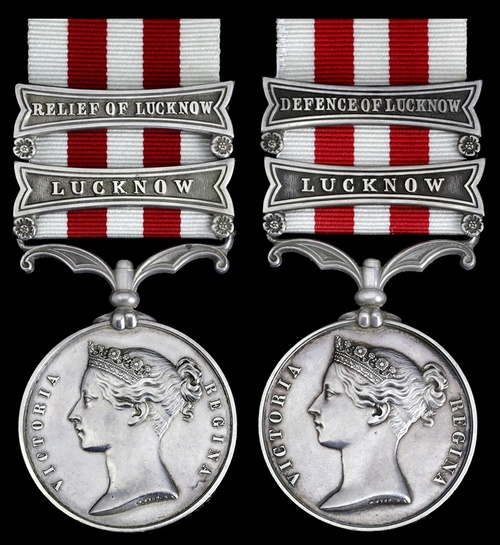
Auction: 18003 - Orders, Decorations and Medals
Lot: 311
(x) A rare 'double-issue' Indian Mutiny pair to Surgeon-General J. J. Clarke, Bengal Medical Department; attached to Sir Henry Havelock's Column, Clarke took part in the first relief of Lucknow, tending the wounded amongst the Residency's squalid conditions while under continuous enemy fire.
Twice mentioned in despatches for his invaluable service, Clarke went on to become Principal Medical Officer to the 1883 Akha Expedition
Indian Mutiny 1857, 2 clasps, Defence of Lucknow, Lucknow (A, Surgn. J. J. Clarke, 3rd Bn. Bengal Art.); Indian Mutiny 1857, 2 clasps, Relief of Lucknow, Lucknow (Asst. Surgn. J. J. Clarke.), good very fine (2)
John James Clarke was born in June 1827. Already a Member of the Royal College of Surgeons, he was appointed Assistant Surgeon with the Bengal Medical Establishment, Meerut Circle, on 14 May 1853. Clarke was serving at Bandha in Oudh on 10 May 1857, when the Indian Mutiny began at Meerut. He managed to escape from mutinous sepoys, joining General Sir Henry Havelock's column at Cawnpore on 6 August. Havelock assigned Olphert's Battery of Bengal Horse Artillery to Clarke's medical care, a role he ably fulfilled in the actions at Mungawar and the Alumbagh.
Havelock's column fought through the narrow streets of Lucknow, finally reaching the beleaguered Residency on 25 September. For the ensuing two months, Clarke laboured in the appalling conditions of the garrison's hospital, under constant bombardment from rebel artillery. Some of the hospital's patients were shot in their beds by snipers positioned in high buildings overlooking the compound (Edwardes 1973, 89). Assistant Surgeon Francis Collins, 5th Northumberland Fusiliers, recalled the horror in his diary (see Lot 141, April 2018):'The hospitals here are miserable, staff deficient, no food for sick men, no clothing; and the consequence is that many poor fellows, who could probably recover with proper treatment and nutritious food, die off from sheer filth and starvation. Very few amputation cases have recovered, you will be shocked with the bill of mortality within the trenches of Lucknow when it reaches you… It is a sad state of things and you may imagine with what anxiety we are looking for reinforcements.'
With the arrival of Sir Colin Cambell's force on 19 November, the Residency's garrison was finally relieved and evacuated. Clarke served under Sir James Outram while he held the Alumbagh against repeated assaults. He was present at the capture of Lucknow by Sir Colin Campbell in March 1858, again giving medical provision to Olphert's Battery. During operations to suppress final pockets of resistance in Oudh, he took medical charge of the 1st Sikh Irregular Cavalry. For these services, Clarke was mentioned in despatches (London Gazette, 31 March 1858).
Clarke was promoted to Surgeon on 15 June 1864. Returning to England, he qualified as a Doctor of Medicine at St. Andrew's in 1872. Advanced to Surgeon-Major in May 1873, he again served in India, becoming Deputy Surgeon-General on 20 December 1879. His final posting was to the North-East Frontier, as Principal Medical Officer for the expedition against the Akha in southern China (1883-1884), a role for which he was again mentioned in despatches.
Clarke retired from the service with the rank of Surgeon-General on 14 January 1884 (London Gazette, 8 April 1884 and 3 October 1884), and was awarded a Good Service Pension.
Recommended reading:
Edwardes, M., A Season in Hell: Defence of the Lucknow Residency (London, 1973).
Subject to 5% tax on Hammer Price in addition to 20% VAT on Buyer’s Premium. For more information please view Terms and Conditions for Buyers.
Sold for
£2,600




